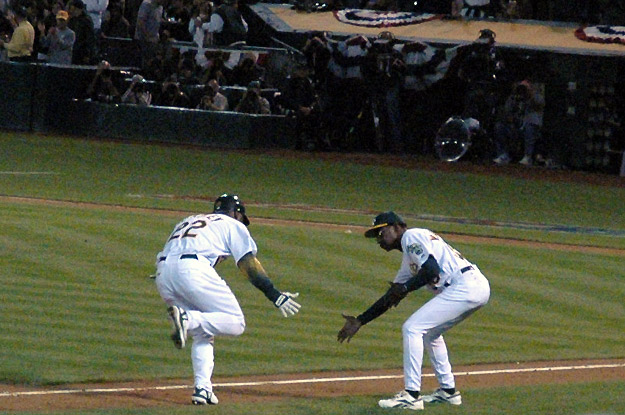One of my best friends grew up in Michigan. If you ask him his favorite baseball team, he’ll say the Detroit Tigers. But the truth is, he pays about as much attention to baseball as my mother, who lives in Sweden; that is to say, he pretty much ignores the topic entirely.
This morning, however, he sent me this email:
Ken,
Can anyone on the A’s roster hit a 102 mph fastball? I think such a skill might come in handy in the near future.
“Uh-oh,” I thought. “This is not good.”
* * *
Those who do not follow sports often cannot fathom why those of us who do devote so much time and energy to it. My mother always thought my passion for sports would be something I’d grow out of. It hasn’t happened yet.
Paul Ford has a fabulous blog entry called Men standing around broken machines. It’s about the mysterious way that men communicate their feelings for each other through the act of fixing things:
For much of my life I was able to bring myself to an emotional boil by reading or writing. I used this as a kind of fuel and assured myself that in my agonies I was more intense than the person sitting next to me on the subway. But I have come to sympathize with those men who stood around saying little, who gathered around the open hoods of brown cars or around malfunctioning typewriters.
And today, over on Bronx Banter and Dodger Thoughts, the men are standing around their broken machines, trying to figure out what went wrong.
And here on Catfish Stew, the men ponder how to avoid the same sad fate, in the face of
102 mph fastballs, and a convoy of Michiganders heading into town.
* * *
It all sounds so noble, this cooperative effort to fix things. But we men aren’t quite such simple creatures. There’s a certain amount of competition within this cooperation, too. There’s a wonderful Darwinian balance between altruistic behavior that helps the group survive, and selfish behavior that increases the social status of the individual within the group.
You want your group to fix the car, but preferably when you find the solution. Men cooperate and compete with their friends at the same time.
* * *
When the A’s beat the Twins, I felt a huge burden lift. The A’s failures in the postseason was no longer a machine that needed to be fixed. I felt like I could simply sit back, and appreciate the beauty of playoff baseball. Whatever else happened would be gravy.
But now, the stakes have been raised. My buddy from Michigan has been given a potentially devastating weapon in our relationship. Should the Tigers happen to defeat the A’s in the ALCS, he will have permanent ammunition over me in any discussion we may have from this point forward.
We could be discussing foreign politics or operating systems or Battlestar Galactica, and I could rebut every point he makes with a brilliant counteranalysis, and all he’d have to do to win the argument is to play the “Yeah, but Detroit won the 2006 ALCS” card and I will be helpless to do anything but crawl back under my rock in meek submission.
And since he doesn’t really give a hoot about baseball, I can’t pull out the “1972 ALCS” card in response. Nor will I gain any advantage if the A’s win. If the Tigers lose, it won’t bother him in the slightest.
What was the subtitle of Moneyball? The art of winning an unfair game? This is an unfair game. I care about this ALCS, and he doesn’t. He can’t lose; I can’t win. My best case scenario in this particular game is a tie.
My feelings of pure altruism toward playoff baseball lasted about a day and a half. My competitive drive has returned. I need the A’s to beat the Tigers. How do we fix it so that happens?



